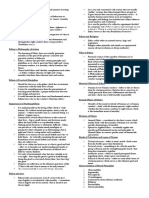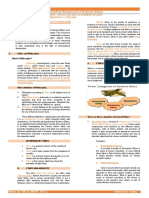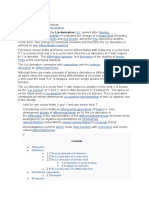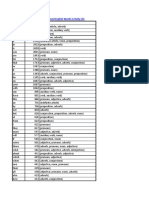0 ratings0% found this document useful (0 votes)
6 viewsModule 1
This document discusses moral standards, ethics, and moral dilemmas. It defines key terms like morality, ethics, amoral actions, and moral dilemmas. Morality is derived from shared customs and standards in a society, while ethics reflects on these rules. Moral dilemmas involve situations where a moral agent must choose between options that both compromise moral principles. There are different types of moral dilemmas based on factors like the options available, obligations, and whether the dilemma is self-imposed or imposed by external events.
Uploaded by
Lai SinghCopyright
© © All Rights Reserved
Available Formats
Download as DOCX, PDF, TXT or read online on Scribd
0 ratings0% found this document useful (0 votes)
6 viewsModule 1
This document discusses moral standards, ethics, and moral dilemmas. It defines key terms like morality, ethics, amoral actions, and moral dilemmas. Morality is derived from shared customs and standards in a society, while ethics reflects on these rules. Moral dilemmas involve situations where a moral agent must choose between options that both compromise moral principles. There are different types of moral dilemmas based on factors like the options available, obligations, and whether the dilemma is self-imposed or imposed by external events.
Uploaded by
Lai SinghCopyright
© © All Rights Reserved
Available Formats
Download as DOCX, PDF, TXT or read online on Scribd
You are on page 1/ 4
Module 1: Moral versus non-moral “white” lie and “white” lies
standards are permissible in that
society, then I am actually
I. Derivation of Moral Standards
acting amorally.
The foundations of evolving moral
III. Ethics and Morals
systems rest on a complex cybernetic
process. The term ethics comes from Greek
It is a dynamic process that drives the ethos, which means the customs, habits
creation of moral and ethical standards. and mores of people.
Every human action inspires a Morality is derived from the Latin mos,
corresponding reaction, whether in moris, which denotes basically the
nature or violent. same; Cicero introduced it as an
Emotions can get out of control if not equivalent to the Greek ethos.
regulated by the following: Morality means the customs, special do-
Laws s, and don’t-s shared and widely
Customs accepted as standards in a society or
Moral codes community.
Professional codes Ethics is the philosophical reflection
Rules of etiquette upon these rules and ways of living
Mathematically, the initial point evident together, the customs and habits of
in human behavior is the survival of the individual, groups or mankind as such.
species. Aristotle ethics focused mainly on
It is defined and redefined pursuing the ‘good (life)’, the
in many ways, such as a eudaimonia.
concern for public safety. The aim was to identify
The complexity of this process cannot and to practically realized
be understated and best described by ‘the (highest) good’ in life –
cybernetic science. means that you have to
evaluate what is ‘good’ as
II. Ethical Terms (Amoral, Nonmoral, and regards content: what life
Immoral) is a good life and what is
Nonmoral actions or events: those not?
areas of interest where moral categories Three branches of Ethics:
cannot be applied. Descriptive ethics – aims
Ex: wear socks of a at empirically and precisely
specific shade of color. mapping existing morality
Immoral actions or events: those areas within communities,
of interest where moral categories apply therefore linked to the
and of are such kind as evil… social sciences.
Ex: telling a lie Metaethics – the aim is to
Amoral actions or events: those areas understand better the
of interest exhibiting indifference to and logical, semantic, and
not abiding by society's moral rules or pragmatic structures of
codes. moral and ethical
Ex: If I tell a lie without argumentation as such,
concern for the moral rules their origin and meaning.
of society and it is a
Normative ethics – Karen Allen has three conditions that
methodological reflection must be present for situations to be
upon morality tackling its considered moral dilemmas.
critique and its rationale. The agent of moral action
Applied ethics (sub- is obliged to make a
branch of normative decision about which
ethics) course of action is best.
Normative theories are There must be different
applied to specific, courses of action to
controversial moral issues choose from.
like animal rights, abortion No matter what course of
euthanasia etc. action is taken, some
Three main theories of Normative Ethics moral principles are
Deontological – duty always compromised.
theories locate the basis of Types of Moral Dilemmas
morality on specific, Epistemic and ontological
foundational and principles dilemmas – the moral
of duty and obligation. agent here does not know
Consequentialist – which option is morally
determine the value of an right or wrong.
action on the grounds of a Ontological moral
cost-benefit analysis of its dilemmas – involves
consequences. situations wherein
Virtue theories focus on a two or more moral
given set of rules like “do requirements
not steal” conflict with each
other. (neither of the
Module 2: Moral Experiences
moral requirements
Dilemma –a situation where a person is is stronger than the
forced to choose between two or more other)
conflicting options, neither of which is Self-imposed and world-
acceptable. imposed dilemmas:
*If a person is in a difficult situation but Self-imposed moral
is not forced to choose between two or dilemma is caused
more options, then that person is not in by the moral agent’s
a dilemma. wrongdoings.
When dilemmas involve human actions World-imposed
which have moral implications, they moral dilemma,
are called ethical or moral dilemmas. means that certain
Moral dilemmas, are situations where events in the world
persons are called moral agents. place the agent in a
In ethics, we are forced to situation of moral
choose between two or conflict.
more conflicting opinions, Obligation & Prohibition
neither of which resolves dilemmas:
the situation in a morally Obligation are
acceptable manner. situations in which
more than one
feasible action is sense faculties such as
obligatory. digestion etc.
Prohibition involves Intellect (rationality) also plays a role in
cases in which all approving human acts.
feasible actions are Guides a person to do acts
forbidden. that are either considered
Single agent and multi- morally good or morally
person dilemmas: bad.
Single agent Cultural Relativism
dilemma, the moral Are the view that moral or
agent is compelled ethical systems, which
to act on two or vary from culture to
more equally the culture, are all equally
same moral options, valid and no one system is
but she cannot really “better” than any
choose both. other.
Multi-person Strengths and Weaknesses of Cultural
dilemma – occurs in Relativism
situations that Strengths:
involve several Different social contexts
persons like a demand different moral
family, an guidelines
organization, or a Arrogant for one society to
community who is judge another
expected to come Morality is reflected in
up with consensual actual behavior
decision on a moral Weaknesses:
issue at hand. Two societies do have
Module 3: Culture and Morality different moral views
doesn’t mean they ought
A moral agent is a person who can to have different views
discern right from wrong and be held Doesn’t explain how moral
accountable for his or her own actions. guidelines are determined
Human act vs Act of Man Doesn’t explain how
Human act is an act on guidelines evolve
which an individual can Provides no way out for
make a conscious decision cultures in conflict
whether or not to carry out Mare practices are
that act. acceptable does not mean
Becomes any cultural practice is
good or bad acceptable (many/any
depending fallacy)
on what the Societies do, in fact, share
moral agent certain core values
makes of it. Only indirectly based on
Act of man is the natural reason
act of vegetative and Not a workable ethical
theory
Filipino Way
The Filipino sense of good
and bad is a value-based
ethics (axiological ethics)
Three Filipino Character
Traits
Personalism is the
emphasis Filipinos to give
to interpersonal relations
or face-to-face encounters.
Familialism emphasizes
the welfare and interest of
the family over those of the
community.
Particularism results from
the strong family influence
on individual and group
behavior.
Flaws of Filipino Morality:
Exclusivist or the tribal,
undertone of the socially
harmonizing tendency of
the Filipino.
Consequentialism makes
it difficult for the Filipino to
see that the authentically
good actions are those
actions that immediately
and mediately preclude
evil effects on him and on
his community.
The trails toward moral progress in
Filipino morality is through rectifications
of these shortcomings
To have an inclusivist and meta-
tribal harmony and a rigorous
consequential morality
Reconstruction of the objective
criteria of morality
You might also like
- Ethics Midterms With Finals Reviewer Module 1 6No ratings yetEthics Midterms With Finals Reviewer Module 1 623 pages
- Reviewer in Ethics Leeson 1 What Is Ethics: Ethics or Moral Philosophy Can BeNo ratings yetReviewer in Ethics Leeson 1 What Is Ethics: Ethics or Moral Philosophy Can Be40 pages
- Midterm Chapter 1 - Moral Versus Non-Moral StandardsNo ratings yetMidterm Chapter 1 - Moral Versus Non-Moral Standards3 pages
- ethics-midterms-with-finals-reviewer-module-1-6No ratings yetethics-midterms-with-finals-reviewer-module-1-623 pages
- Reviewer in Ethics Introduction To EthicsNo ratings yetReviewer in Ethics Introduction To Ethics3 pages
- Highest Passing Score Cutie Sa Ethics MidtermNo ratings yetHighest Passing Score Cutie Sa Ethics Midterm9 pages
- Course Orientation and Importance of Rules: Understanding Morality and Moral StandardsNo ratings yetCourse Orientation and Importance of Rules: Understanding Morality and Moral Standards2 pages
- Ethics Origin: The Word "Ethics" Is Derived Basic Ethical PrinciplesNo ratings yetEthics Origin: The Word "Ethics" Is Derived Basic Ethical Principles3 pages
- OTB195 01 Key Concepts of Intermediate MathNo ratings yetOTB195 01 Key Concepts of Intermediate Math275 pages
- List of Christian Denominations by Number of Members4 PDF100% (1)List of Christian Denominations by Number of Members4 PDF16 pages
- The Pearl 14th Century English Poem Giovanni Boccaccio 1313-1375 Sir Israel Gollancz 1921No ratings yetThe Pearl 14th Century English Poem Giovanni Boccaccio 1313-1375 Sir Israel Gollancz 1921362 pages
- Lie Derivative: From Wikipedia, The Free EncyclopediaNo ratings yetLie Derivative: From Wikipedia, The Free Encyclopedia19 pages
- Lecture 5 - CS50's Web Programming With Python and JavaScriptNo ratings yetLecture 5 - CS50's Web Programming With Python and JavaScript24 pages
- Scaffolding Techniques For English Language Learners - Part 1 - Collaborative ClassroomNo ratings yetScaffolding Techniques For English Language Learners - Part 1 - Collaborative Classroom2 pages
- Analytica Prediction of Availabel Rotation Capacity of Cold Formed RHS and SHS BeamsNo ratings yetAnalytica Prediction of Availabel Rotation Capacity of Cold Formed RHS and SHS Beams12 pages
- CH 3 - IKS - PPT - Holistic Decision Making Analytical Approaches of WestNo ratings yetCH 3 - IKS - PPT - Holistic Decision Making Analytical Approaches of West24 pages
- Reviewer in Ethics Leeson 1 What Is Ethics: Ethics or Moral Philosophy Can BeReviewer in Ethics Leeson 1 What Is Ethics: Ethics or Moral Philosophy Can Be
- Midterm Chapter 1 - Moral Versus Non-Moral StandardsMidterm Chapter 1 - Moral Versus Non-Moral Standards
- Course Orientation and Importance of Rules: Understanding Morality and Moral StandardsCourse Orientation and Importance of Rules: Understanding Morality and Moral Standards
- Ethics Origin: The Word "Ethics" Is Derived Basic Ethical PrinciplesEthics Origin: The Word "Ethics" Is Derived Basic Ethical Principles
- List of Christian Denominations by Number of Members4 PDFList of Christian Denominations by Number of Members4 PDF
- The Pearl 14th Century English Poem Giovanni Boccaccio 1313-1375 Sir Israel Gollancz 1921The Pearl 14th Century English Poem Giovanni Boccaccio 1313-1375 Sir Israel Gollancz 1921
- Lie Derivative: From Wikipedia, The Free EncyclopediaLie Derivative: From Wikipedia, The Free Encyclopedia
- Lecture 5 - CS50's Web Programming With Python and JavaScriptLecture 5 - CS50's Web Programming With Python and JavaScript
- Scaffolding Techniques For English Language Learners - Part 1 - Collaborative ClassroomScaffolding Techniques For English Language Learners - Part 1 - Collaborative Classroom
- Analytica Prediction of Availabel Rotation Capacity of Cold Formed RHS and SHS BeamsAnalytica Prediction of Availabel Rotation Capacity of Cold Formed RHS and SHS Beams
- CH 3 - IKS - PPT - Holistic Decision Making Analytical Approaches of WestCH 3 - IKS - PPT - Holistic Decision Making Analytical Approaches of West

























































































